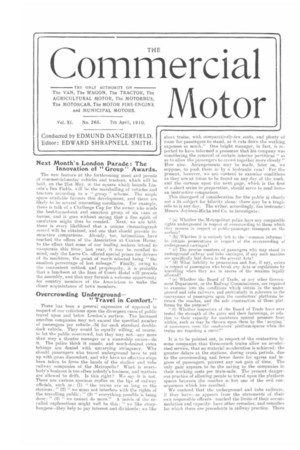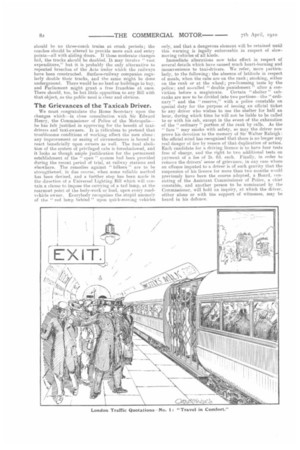Overcrowding Underground
Page 1

Page 2

If you've noticed an error in this article please click here to report it so we can fix it.
" Travel in Comfort."
There has been a general expression of approval in respect of our criticisms upon the divergent cases of public travel upon and below London's surface. The harassed omnibus companies may not exceed the specified number of passengers per vehicle-34 for each standard doubledeck vehicle. They would be equally willing, of course, to let the public overcrowd, but they may not—any more than may a theatre manager or a steamship owner--do it. The police think it unsafe, and much-desired extra takings are denied with unvatTing stringency. Why shank passengers who travel underground have to put up with gross discomfort, and why hnve no effective steps been taken to force the hands of the shallow and tube railway companies of the Metropolis? What is everybody's business is too often nobody's business, and matters are allowed to drift. Is this right ? We say it. in not. There are various specious replies on the lips of railway officials, such as: (1) " the trains are as long as the stations; " (2) " we must not interfere with the rights of the travelling public ; " (3) " everything possible is being done ; " (4) " we cannot do more." A pr6eis of the salcalled explanations might well be this: " we like straphangers—they help to pay interest and dividends; we like short trains, with comparatively-few seats, and plenty of room for passengers to stand, as it cuts down the working expenses so much." One bright manager, in fact, is reported to have informed a pressman that his company was considering the removal of certain interior partitions " so as to allow the passengers to crowd together more closely," How nice. Arrangements may be made, later on, we suppose, to push them in by a hydraulic ram! For the present, however, we are content to examine conditions as they are at times to be found on any day of the week, and the cartoon upon the next page, which is the first of a short series in preparation, should serve to send home an instructive comparison.
This disregard tif consideration for the public is clearly not a fit subject for hilarity alone: there may be a tragic side to it any day. The writer, accordingly, has instructed Messrs. Joynson-Hicks and Co. to investigate: " (a) Whether the Metropolitan police have any comparable rights underground in respect of overcrowding to those which they possess hi respect of public-passenger transport on the surface?
" (b) Whether it is entirely left to the ' common informer to initiate prosecutions in respect of the overcrowding of underground carriages? " (c) The precise numbers of passengers who may stand in underground railway and tube carriages, if any such maxima are specifically laid down in the several Acts?
" (d) What liability to prosecution and fine, if any, exists in respect vf passengers who break any Acts or regulations by travelling when they are in excess of the maxima legally allowed?
" (e) Whether the Board of Trade, or any other Government Department, or the Railway Commissioners, are required to examine into the conditions which obtain in the underground and tube railways, arid particularly in reference to the conveyance of passengers upon the conductors' platforms between the coaches, and the safe construction of these platforms inc the purpose? " (f) Whether inspectors uf the Board of Trade have ever tested the strength of the gates and their fastenings, in relation to their capacity for resistance against pressure from within, each as may be thrown upon them by the surging ' of passengers upon the conductors' platform-spaces when the trains are rounding a curve?"
It is to be pointed out, in respect of the contention by some companies that three-coach trains allow an accelerated service, that no material acceleration is achieved : the greater delays at the stations, during crush periods, due to the overcrowding and fewer doors for egress and ingress of passengers, prevent any net gain of time. The only gain appears to be the saving to the companies in their working costs per train-mile. The present dangerous practice of allowing people to travel upon the platform spaces between the coaches is but one of the evil consequences which has resulted. We contend that the underground and tube railways, if they have—as nppears from the statements of their own responsible officer--reached the limits of their accommodation and capacity, have other remedies, and remedies for which there are precedents in railway practice. There should be no three-coach trains at crush periods; the coaches should be altered to provide more exit and entry points—all with sliding doors. If these moderate changes fail, the tracks should, be doubled. It may involve " vast expenditure," but it is probably the only alternative to repeated breaches of the Acts under which the railways have been constructed. Surface-railway companies regularly double their tracks, and the same might be done underground. There would be no land or buildings to buy, and Parliament might grant a. free franehise at once. There should, too, be but little opposition to any Bill with that object, as the public need is clear and obvious,






















